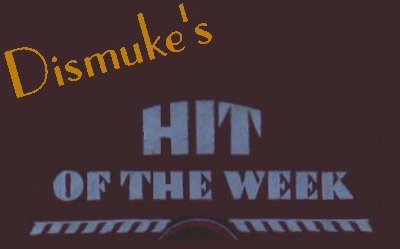

October 2002
October 31, 2002
This week's Hit of the Week is brought
to you by
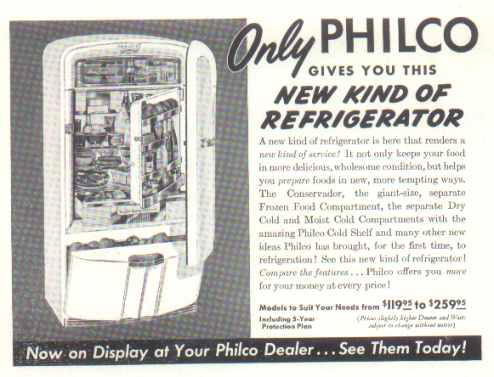
PHILCO
(from 1941 ad)
 Audio
file updated 10/26/2005 Audio
file updated 10/26/2005
A
Clarinet In A Haunted House
Johnny Messner and His Orchestra
1941
(Decca 4040-B mx 69759)
Here is an interesting selection
that I thought would be appropriate to feature on Halloween.
Johnny Messner was a scholarship
student at New York's Julliard School of Music. During the early
1930s, he played along side his four brothers in the Dick Messner
Orchestra. When the brothers decided to leave the music business
in 1937, Johnny decided to form his own band and successfully landed an
engagement at the Hotel McAlpin in New York City that lasted six years.
October 24, 2002
This week's Hit of the Week is brought
to you by

WILLYS OVERLAND
(from 1925 ad)
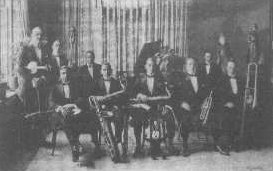
The Paul Whiteman Orchestra circa
1921
Image from 1921 Victor Talking
Machine Co. cataloge
Oriental
(Original
Acoustical Version)
Paul Whiteman and His Orchestra
1922
(Victor 18940-B)
Oriental
(Electrically
Recorded Remake)
Paul Whiteman and His Orchestra
1928
(Victor 21599-B )
I thought it might be fun to do
an exercise in compare and contrast. Here are two different recordings
by the Paul Whiteman Orchestra of the same composition.
The first recording was made acoustically
(i.e. pre-microphone) in 1922 and appeared on the flip side of the band's
version of "Three O'Clock in the Morning." "Oriental"
is a fox trot tempo adaptation by Whiteman and his staff arranger Ferde
Grofé of a work written in 1893 by Russian composer César
Cui (1835-1918). The record was very successful and sold over
a million copies.
When Whiteman's contract with
the Victor Talking Machine Company came up for renewal in 1928, he decided
to instead jump ship and sign with arch-rival Columbia. Faced
with the loss of their most popular band, Victor executives decided to
make the most of the last few months of Whiteman's contract and ordered
the band into the recording studio. Among the dozens of sides recorded
during the band's final months at Victor were remakes of several of Whiteman's
early hits using the vastly superior electrical recording technology that
had been introduced in 1925. As with the original version, the remake
of "Oriental" was paired with a new recording of "Three O'Clock In The
Morning."
The arrangement used in each recording
is, as far as I can tell, nearly identical. But observe that the
1928 remake was played significantly faster thereby reducing the playing
time by about 36 seconds. Perhaps the intent was to appeal
to the faster paced "Jazz Age" tastes of the late '20s. The
side by side comparison certainly illustrates just how much of a
dramatic step forward the electrical recording process was.
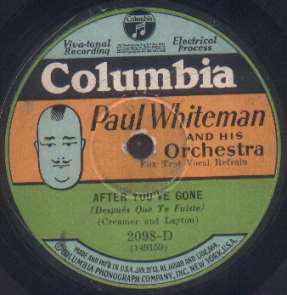
| When the Paul Whiteman left Victor
for Columbia in 1928, Columbia introduced a special label for
his band's recordings. Collectors refer to it as the "Potato Head"
label because of its Whiteman caricature. Ted Lewis was another Columbia
star who eventually was given his own unique label. |
After
You've Gone
Paul Whiteman and His Orchestra
Bing Crosby, vocal
1929
(Columbia 2098-D mx 149159)
For those who prefer something somewhat
jazzier, here is a Whiteman recording that I am rather fond of.
My copy is in moderately worn condition - but my audio restoration software
did a decent job of cleaning it up. Near the end of the recording,
you will hear the famous team of jazz violinist Joe Venuti and guitarist
Eddie Lang with a nice solo by Venuti. No - that's not Bix Beiderbecke
on the cornet but rather Andy Secrest who replaced him. When
this recording was made, Bing was still just a rank and file member of
Whiteman's "Rhythm Boys" vocal trio. If you look at the above
photo, you will see that Bing's performance was not even credited on the
label and was noted only by the words "vocal refrain." Two years
later he was one of the Brunswick label's biggest stars.
October 17, 2002
This week's Hit of the Week is brought
to you by
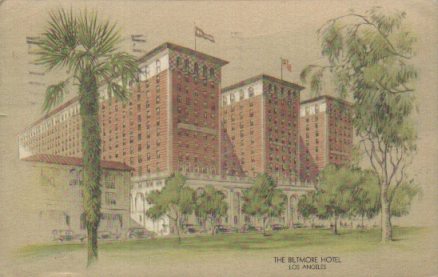
The Biltmore
Hotel
LOS ANGELES
(from circa 1930s postcard)
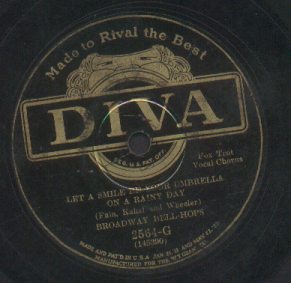
Let
A Smile Be Your Umbrella
On
A Rainy Day
Broadway Bell-Hops
Lewis James, vocal
1928
(Diva 2564-G mx 145390)
"Broadway Bell-Hops" was a recording
pseudonym used by the Sam Lanin Orchestra on Columbia's bargain Harmony,
Velvet Tone and Diva labels. The band made a number of enjoyable
sides under the Bell-Hops name - but, unfortunately for us, they were all
recorded acoustically, despite the fact that electrical recording had been
the industry standard since 1925. The continued use of the inferior
method of recording was due to the fact that, in 1923, Columbia made a
sizable investment in upgrading its acoustical recording facilities.
When the advent of electrical recording made the technology obsolete just
two years later, Columbia executives were reluctant to see that investment
go to waste and decided to continue using it for recordings destined for
release on its new bargain label, Harmony. About a year
or so later, another bargain label called Velvet Tone was launched.
The Diva label came along in 1927 and was sold through the W.T.Grant dime
store chain. The labels had an identical output of recordings
- the only difference other than the label art being the fact that Velvet
Tones had a catalogue number 1000 higher than the identical release on
Harmony and Divas had a catalogue number that was 2000 higher. There
were occasional exceptions (most notably the recordings of Annette
Hanshaw ) where an electrical recording was released on the three
Columbia bargain labels - but for the most part, their offerings continued
to be acoustical until 1930. Certainly it makes one wonder
about the slogan "Made To Rival The Best" which appeared on the top of
all Diva labels.
October 10, 2002
This week's Hit of the Week is brought
to you by
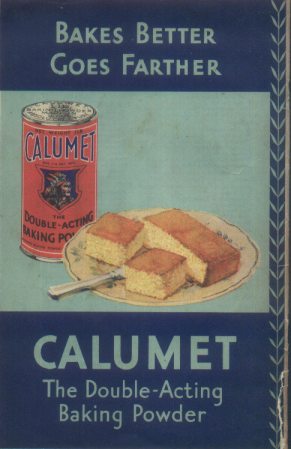
(from 1931 promotional recipe book)
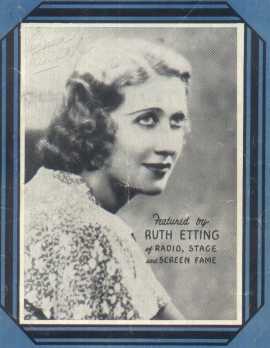
(Photo from 1934 sheet music cover)
Back
In Your Own Back Yard
Ruth Etting, vocal;
Phil Schwartz, piano
1928
(Columbia 1288-D mx 145465)
Ruth Etting (1896-1978) was a pioneer
female jazz vocalist who was enormously popular during the 1920s and 1930s.
Today, she is best remembered as the inspiration of the 1955 Doris Day-James
Cagney movie biography about her turbulent life, Love Me Or Leave Me.
At the age of 17, Etting left her
hometown of David City, Nebraska to study costume design at Chicago's Academy
of Fine Arts. To pay her bills, Etting accepted a part time
job as a milliner in a hat shop. The shop's owners had show business
connections and arranged for her to audition for the chorus in Chicago's
Rainbow Gardens. Etting landed the job and began performing
as a dancer and singer in various Chicago nightclubs and hotels.
The Jazz Age, of course, coincided
with Prohibition. During this period in Chicago, the nightclub scene,
as well as many other aspects of the city, were firmly under the control
of various mobsters. Etting became friendly with one such mobster,
Chicago "businessman" Martin Snyder - who was more commonly
known as "Moe the Gimp" because of his lame left leg. Etting married
Snyder in 1922 and he assumed management of her career. Through
his connections, he landed her a regular broadcast with Abe Lyman's orchestra
over radio station WSL. This in turn led to a recording contract
with Columbia Records where she had her first recording session in February,
1926. Her records sold well and she was eventually dubbed by
the Columbia marketing department as "The Recording Sweetheart" and "The
Sweetheart of Columbia Records."
Her biggest break came in 1927 when
Florenz Ziegfield cast her in the Ziegfield Follies of 1927 at New
York's New Amsterdam Theatre in which she had a show stopping performance
of the Irving Berlin song "Shaking The Blues Away." A year
later, Ziegfield gave her the lead female role opposite Eddie Cantor in
another highly successful Broadway show, Whoopee!
Between 1928 and 1936, Etting appeared
in 43 movies and musical short features - including Roman Scandals (1933)
and Hips Hips Hooray (1934). She appeared as a guest on numerous
network radio programs during the early 1930s and had her own show
from 1933-1936. She also wrote several songs, including "When You're
With Somebody Else" - her performance of which occupies the
flip side of this week's featured recording. Between 1926 and
1937, Etting recorded over 200 sides - 62 of which became hits.
Despite Etting's spectacular career
success during the 1920s and 1930s, her private life was hell. Snyder
was an abusive and jealous husband and an overall repulsive person. Etting
has been quoted as saying that she married him "nine-tenths out of fear
and one-tenth out of pity." Their relationship finally came
to an end in 1937 when Etting divorced him and became engaged to pianist
Mryl Alderman. In 1938, consumed by jealousy, Snyder shot Alderman
in cold blood. Alderman survived and a sensationalized trial
followed. Snyder was convicted of attempted murder. When he
later appealed the verdict, Etting and Alderman chose not to appear in
court and he was released after spending a year in prison.
Etting married Alderman after the end of the trial in December 1938 and
retired from show business. By that time, her popularity was already
beginning to wane as her style of singing was increasingly regarded as
old fashioned. She made occasional broadcast appearances during World
War II and embarked on an unsuccessful come back attempt during the late
1940s. In 1948, she retired from show business for good and spent
the rest of her life at her and her husband's ranch in Colorado Springs,
Colorado.
October 3, 2002
This week's Hit of the Week is brought
to you by
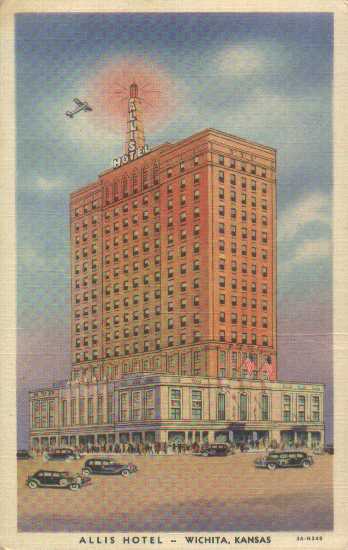
"A Friendly Hotel"
ALLIS HOTEL
Wichita, Kansas
- - - -
· Tallest Building In Kansas
· 350 Rooms with Tub and Shower
· Circulating Ice Water and Radio
- - - -
(from 1933 postcard)
Doing
The Boom Boom
Leo Reisman and His Orchestra
1929
(Victor 22115-B)
Leo Reisman's band was popular with
the New York high society crowd and had lengthy engagements at the Hotel
Brunswick, the Central Park Casino and the Waldorf=Astoria Hotel.
Before entering the dance band business, Reisman was a scholarship
violin student at the New England Conservatory of Music and First Violinist
with the Baltimore Symphony. He formed his first band in the 1910s
and remained active through at least the 1940s. On radio, the band
was featured on the
Ponds Program (which, in addition to music,
featured talks by First Lady Elanore Roosevelt) as well as on Lucky Strike's
Your
Hit Parade. The height of the band's popularity on records was
during the late 1920s and early 1930s.
The rather unusual song in this
week's update comes from the William Fox talking picture "Why Leave
Home?" a musical comedy which starred Dixie Lee (the future Mrs.
Bing Crosby). The film also contained an uncredited bit appearance
by a sax player and occasional vocalist from the George Olsen band.
That sax player would later become one of Hollywood's biggest stars - Fred
MacMurray.

|


